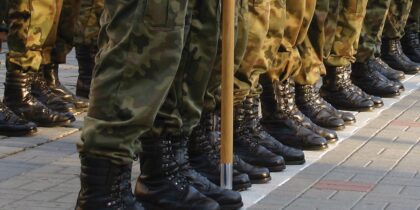By Andy Bell
“Given the long history of human conflict, it is likely that moral injury has been suffered for as long as we have possessed a moral compass.” (Ray Lock)
It is now widely understood and acknowledged that Armed Forces personnel are likely to encounter traumatic events during their service, and research has shown that for some this can lead to mental health difficulties. But until recently, little research has focused on the impact of traumatic events that may not have been life threatening but violated your deeply held moral or ethical beliefs. A report written by researchers at King’s College London and funded by the Forces in Mind Trust has explored what we know about moral injury among Armed Forces personnel and veterans.
Moral injury is defined in the report as: “psychological distress, including feelings of deep shame and guilt, resulting from doing, or not preventing, incidents that one believes are ‘wrong’.” They note that “moral injury can be caused by a range of experiences including committing harmful acts, failing to stop the harmful acts of others or bearing witness to human suffering.”
It is important to note that moral injury is not a mental illness (unlike, for example, post-traumatic stress disorder, PTSD). But experiencing a morally injurious event can lead to profound feelings of shame and guilt which can, in turn, contribute towards the development of mental health problems and suicidal feelings. In other words, morally injurious experiences may be a significant and often unseen risk factor for a range of later difficulties.
“moral injury can be caused by a range of experiences including committing harmful acts, failing to stop the harmful acts of others or bearing witness to human suffering.”
Despite this, moral injury remains poorly understood and there are no specific treatments for people who experience moral injury-related mental illness. The present research carried out by researchers at King’s College London aimed to address these gaps, exploring the types of experiences which may lead to moral injury in UK military veterans; what makes someone more or less at risk of mental health difficulties following moral injury; the impact of moral injury on wellbeing; and what support may be needed for people who have experienced a morally injurious event.
The types of experiences which may lead to moral injury in UK military veterans were found to include situations including witnessing human suffering (such as the after-effects of ethnic cleansing in Bosnia or Rwanda), having a role in the death or mistreatment of civilians or combatants, or experiencing a betrayal event ‘within ranks’, for example bullying or negligence.
“If I was to go into a town and shoot five people, I would be a mass murderer. Yet if I was to shoot five people in uniform overseas you are legally entitled to do that because you have rules of engagement and all the rest of the stuff. But murder is murder at the end of the day. Killing is killing.”
The researchers also looked at factors that might make an event more or less likely to result in moral injury, or that make an individual more or less at risk of later mental health problems. They found that people may be more likely to experience moral injury if they lacked social support, if they had experienced childhood adversity, if the event involved unclear rules of engagement, or if they felt they were psychologically or emotionally unprepared. Addressing these potential risk factors might help to protect people from significant levels of later distress.
“You know right from wrong… [but] it’s the consequences of your actions, that’s what you don’t know. You don’t know how it’s going to impact you and I think the Army should really drill that into you in the career’s office…”
The researchers found that veterans who had experienced morally injurious events were more likely to experience a range of mental health difficulties, including PTSD, depression, anxiety and suicidal feelings than those who reported no challenging event during military service. They can also affect a veteran’s family life and employment opportunities:
“I had an horrendous childhood. I joined the Army which was great… The only thing that I’ve been qualified or trained in is killing, weapons training. When I went to the Job Centre there were no jobs on the Job Centre board looking for snipers…In order to cope with all the difficulties, I turned to drugs, I turned to alcohol….”
“I’ve got a problem with authority…. I really struggle with if someone was to raise their voice in frustration or something like that. I can’t take that in, it encourages me to lose my temper myself and just one remark can end in a blazing row.”
Providing support for people who have experienced moral injury is challenging for a number of reasons. As the researchers note, “individuals suffering from moral injuries may be highly reticent in speaking about them with friends or family, or indeed with clinicians, possibly because of the associated guilt or shame”. No validated screening measure for moral injury currently exists and there is also no routine treatment for moral injury-related mental health problems. So while moral injury should be a cause for concern, it is not easy to identify or to treat.
The research focuses on moral injury in relation to Armed Forces personnel and veterans. It is, of course, not exclusive to this group. Most recently, concerns about moral injury have been raised relating to staff working in hospitals treating people with Covid-19, and it can happen in many other contexts, for example to refugees, police officers, social workers or journalists. Therefore, understanding moral injury: how to prevent it, identify it and help people living with it, will be an important area for future research and practice. Moral injury may have been with us for millennia, but we can no longer ignore it or turn away from those who suffer with moral injury-related mental health difficulties.
Experiences of moral injury in UK military veterans is a research publication by King’s College London and Combat Stress, produced with funding from Forces in Mind Trust.



